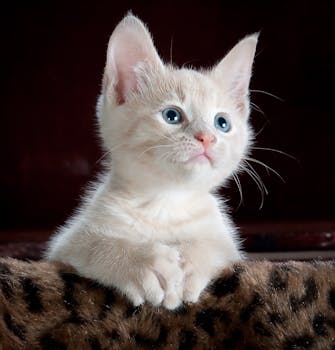
I've always been a dog person. Growing up, we had a series of boisterous canines, each one seemingly more loyal and loving than the last. It wasn't until I moved into my first apartment and adopted a rescue cat named Whiskers that I began to understand the mysterious and captivating world of felines. I remember the day I brought him home, his eyes wide with curiosity and perhaps a little trepidation. As the weeks went by, I began to wonder: do cats recognize their names?
Whiskers was a peculiar creature. Unlike dogs, who eagerly respond to their names with wagging tails and boundless energy, Whiskers seemed indifferent. He would occasionally flick an ear or glance in my direction when I called him, but his responses were inconsistent at best. This led me on a journey to uncover the truth about whether cats recognize their names.
The answer, it turns out, is both fascinating and complex. Recent studies have shown that cats do recognize their names, but their reaction to them is different from what we might expect from other pets. This difference is rooted in their evolutionary history and social behavior. Unlike dogs, which were domesticated to be companions and work alongside humans, cats were domesticated in a more solitary and independent manner.
In a landmark study conducted by Atsuko Saito, a behavioral scientist at Sophia University in Tokyo, researchers observed how cats responded to hearing their names. The study involved 78 cats from various households and a cat café, ensuring a diverse sample. The researchers played recordings of the cats' owners calling their names, as well as recordings of strangers and other familiar and unfamiliar words. The results were intriguing: the cats showed a noticeable response to their names, such as moving their ears, heads, or tails, even if they didn't always come when called.
This study provided compelling evidence that cats can indeed distinguish their names from other words. However, the subtlety of their reactions often leads owners to believe that their feline friends are indifferent. Unlike dogs, who have been bred for sociability and responsiveness to human commands, cats have retained much of their independence. Their evolutionary background as solitary hunters means they are less likely to exhibit overt responses to their names unless there is a clear benefit, such as food or affection.
Whiskers, like many cats, likely recognized his name but chose to respond on his own terms. This behavior aligns with the findings of the study. Cats are highly attuned to their environment and can discern sounds and cues that are relevant to them. They may recognize their names and choose to ignore them, a trait that has often been mistaken for aloofness but is more accurately a reflection of their independent nature.
Understanding that cats recognize their names but respond selectively offers valuable insights into how we can better communicate with our feline companions. Positive reinforcement, such as offering treats or affection when they respond to their names, can encourage more consistent reactions. This approach not only helps in training but also strengthens the bond between owner and cat.
Another fascinating aspect of cats recognizing their names is their ability to associate sounds with specific outcomes. Just as they learn the sound of a can opener or the jingle of their favorite toy, they can learn to associate their names with positive experiences. This associative learning is a powerful tool that can be used to enrich their environment and improve their quality of life.
Reflecting on my experiences with Whiskers, I began to appreciate the subtle ways he communicated and interacted with his surroundings. His occasional acknowledgment of his name, whether through a slow blink or a gentle head tilt, was his way of engaging with me on his own terms. This understanding deepened our connection and helped me to respect his individuality and intelligence.
In conclusion, cats do recognize their names, but their responses are often understated and influenced by their unique evolutionary history and social behaviors. Unlike dogs, who are eager to please and respond to commands, cats maintain a level of independence that can be misinterpreted as indifference. By recognizing and respecting their individuality, we can foster stronger, more meaningful relationships with our feline companions.
If you have a cat, pay attention to the subtle cues and responses they give when you call their name. You might be surprised to find that, like Whiskers, your cat is more attuned to you than you realized, engaging with you in their own distinctive and charming way.